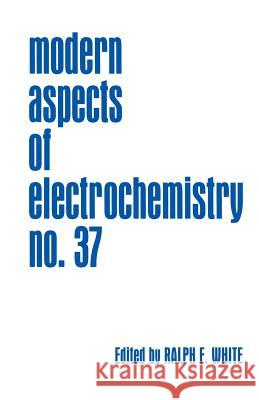Modern Aspects of Electrochemistry » książka
Modern Aspects of Electrochemistry
ISBN-13: 9781461347637 / Angielski / Miękka / 2013 / 368 str.
This volume of Modern Aspects contains seven chapters. The major topics covered in the first six chapters of this volume include fundamentals of solid state electrochemistry; kinetics of electrochemical hydrogen entry into metals and alloys; oxidation of organics; fuel cells; electrode kinetics of trace-anion catalysis; nano structural analysis. The last chapter is a corrected version of chapter four from Volume 35. Faisal M. AI-faqeer and Howard W. Pickering begin the first chapter by going back to 1864 and Cailletet who found that some hydrogen evolved and was absorbed by iron when it was immersed in dilute sulfuric acid. The absorption of hydrogen into metals and alloys can lead to catastrophic failures of structures. They discuss the kinetics of electrochemical hydrogen entry into metals and alloys. In chapter three, Clyde L. Briant reviews the electrochemistry, corrosion and hydrogen embrittlement of unalloyed titanium. He begins by reviewing the basic electrochemistry and general corrosion of titanium. He also discusses pitting and galvanostatic corrosion followed by a review of hydrogen embrittlement emphasizing the formation of hydrides and the effect of these on titanium's mechanical properties. Christos Comninellis and Gy6rgy F6ti discuss the oxidative electrochemical processes of organics in chapter three. They begin by defining direct and indirect electrochemical oxidation of organics. They introduce a model that allows them to distinguish between active (strong) and non-active (weak) anodes. Different classes of organic compounds are used for kinetic models of organic oxidation at active and non-active type anodes.











